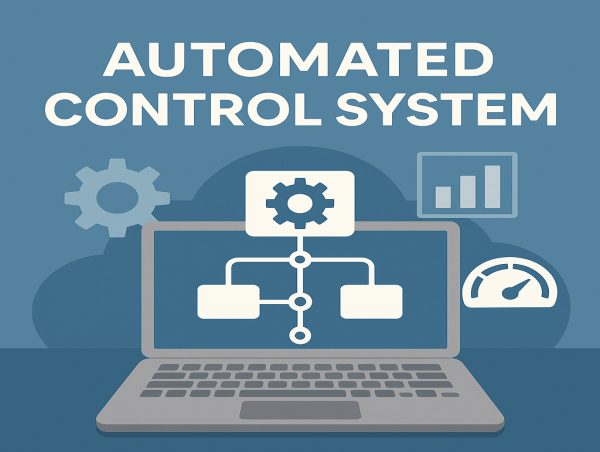The market’s expansion aligns closely with the ongoing transformation in industrial operations. As industries face growing complexity in manufacturing and utility management, automated control systems (ACS) are becoming pivotal in closing operational gaps. These systems enhance efficiency, ensure precision, and allow real-time responsiveness critical in sectors like energy, automotive, water treatment, and pharmaceuticals.
The transition towards environmentally conscious business models is another vital growth contributor. By integrating ACS, industries can better monitor and control energy consumption and reduce resource waste. This not only improves environmental outcomes but also strengthens businesses' operational reliability and productivity.
In a world where competitiveness increasingly hinges on sustainability and digital innovation, automated control systems offer the dual advantage of reducing environmental impact and enhancing industrial efficiency. These systems help industries adopt leaner, smarter, and greener operational models, further amplifying their relevance in today’s industrial landscape.
𝗚𝗮𝗶𝗻 𝗩𝗮𝗹𝘂𝗮𝗯𝗹𝗲 𝗜𝗻𝘀𝗶𝗴𝗵𝘁𝘀 𝗳𝗿𝗼𝗺 𝗜𝗻𝗱𝘂𝘀𝘁𝗿𝘆 𝗘𝘅𝗽𝗲𝗿𝘁𝘀 𝘁𝗼 𝗦𝗵𝗮𝗽𝗲 𝗬𝗼𝘂𝗿 𝗚𝗿𝗼𝘄𝘁𝗵 𝗦𝘁𝗿𝗮𝘁𝗲𝗴𝗶𝗲𝘀. 𝗔𝗰𝗰𝗲𝘀𝘀 𝗼𝘂𝗿 𝗦𝗮𝗺𝗽𝗹𝗲 𝗥𝗲𝗽𝗼𝗿𝘁 𝗡𝗼𝘄: https://www.futuremarketinsights.com/reports/sample/rep-gb-19848
𝗥𝗲𝗽𝗼𝗿𝘁 𝗖𝗼𝘃𝗲𝗿𝗮𝗴𝗲 & 𝗗𝗲𝗹𝗶𝘃𝗲𝗿𝗮𝗯𝗹𝗲𝘀:
The comprehensive market report includes:
- Market size and growth forecasts (2024–2034)
- Competitive landscape and strategic profiles of key players
- Regional performance and investment opportunities
- Market segmentation by component, industry vertical, and deployment
- Key market dynamics including growth drivers, challenges, and opportunities
𝗞𝗲𝘆 𝗙𝗮𝗰𝘁𝗼𝗿𝘀 𝗦𝗵𝗮𝗽𝗶𝗻𝗴 𝗠𝗮𝗿𝗸𝗲𝘁 𝗗𝘆𝗻𝗮𝗺𝗶𝗰𝘀
A strong shift toward smart factories and intelligent systems is shaping the market. Increasing adoption of Industry 4.0, the Industrial Internet of Things (IIoT), and real-time analytics integration are influencing investment in ACS solutions globally.
𝗖𝗹𝗼𝘂𝗱-𝗕𝗮𝘀𝗲𝗱 𝗖𝗼𝗻𝘁𝗿𝗼𝗹 𝗦𝘆𝘀𝘁𝗲𝗺𝘀: 𝗖𝗼𝘀𝘁 𝗘𝗳𝗳𝗶𝗰𝗶𝗲𝗻𝗰𝘆 & 𝗙𝗹𝗲𝘅𝗶𝗯𝗶𝗹𝗶𝘁𝘆
Enterprises are increasingly migrating to cloud-based automated control systems for their scalability, flexibility, and cost-effectiveness. Cloud-based platforms facilitate seamless integration with existing ERP and MES platforms, allowing centralized control and predictive maintenance.
This shift not only reduces the upfront capital required but also allows continuous software updates, making systems more secure and adaptive. As industries grow more decentralized, cloud solutions enable robust multi-site operations with minimal IT overhead.
𝗖𝘆𝗯𝗲𝗿𝘀𝗲𝗰𝘂𝗿𝗶𝘁𝘆 𝗕𝗲𝗰𝗼𝗺𝗲𝘀 𝗖𝗲𝗻𝘁𝗿𝗮𝗹 𝘁𝗼 𝗔𝗖𝗦 𝗗𝗲𝗽𝗹𝗼𝘆𝗺𝗲𝗻𝘁
The digitization of industrial processes increases the attack surface for cyber threats. Thus, cybersecurity in automated control systems is evolving from a compliance requirement to a strategic imperative. Companies are embedding end-to-end encryption, multi-layered security, and AI-driven threat detection into their control infrastructure.
With incidents like ransomware attacks on utility systems making headlines, investment in secure-by-design control systems is rising rapidly. Cyber-resilient ACS are not only essential for data integrity but also for ensuring operational continuity.
𝗜𝗻𝗱𝘂𝘀𝘁𝗿𝗶𝗮𝗹 𝗔𝘂𝘁𝗼𝗺𝗮𝘁𝗶𝗼𝗻 𝗦𝘂𝗿𝗴𝗲 𝗕𝗼𝗼𝘀𝘁𝘀 𝗔𝗖𝗦 𝗗𝗲𝗺𝗮𝗻𝗱
The surging demand for industrial automation in sectors such as oil & gas, automotive, and chemical manufacturing is fueling growth in ACS deployment. These systems offer automated feedback, anomaly detection, and system optimization that improve manufacturing yield and reduce downtime.
Furthermore, the evolution of smart sensors, robotics, and machine learning integration amplifies the relevance of ACS, allowing industries to achieve higher operational efficiency with minimal human intervention.
𝗞𝗲𝘆 𝗧𝗮𝗸𝗲𝗮𝘄𝗮𝘆𝘀:
The global automated control system market is being propelled by the drive for digitization, sustainability, and operational agility. As businesses aim to optimize energy use and productivity, ACS solutions have emerged as critical enablers of smart manufacturing and eco-friendly industrial practices.
𝗕𝗿𝗼𝘄𝘀𝗲 𝗙𝘂𝗹𝗹 𝗥𝗲𝗽𝗼𝗿𝘁 𝗛𝗲𝗿𝗲: https://www.futuremarketinsights.com/reports/automated-control-system-market
𝗘𝗻𝗲𝗿𝗴𝘆 𝗦𝗲𝗰𝘁𝗼𝗿 𝗔𝘂𝘁𝗼𝗺𝗮𝘁𝗶𝗼𝗻 𝗙𝘂𝗲𝗹𝘀 𝗢𝗽𝗽𝗼𝗿𝘁𝘂𝗻𝗶𝘁𝘆
A surge in automation demand in the energy sector—especially in renewables, grid management, and smart metering—is presenting lucrative opportunities for ACS vendors. These systems allow energy firms to enhance demand-response strategies and integrate distributed energy resources effectively.
Governments and private players are investing in smart grids and real-time monitoring, further accelerating the deployment of advanced control systems to stabilize energy distribution and maximize system uptime.
𝗜𝗻𝗳𝗿𝗮𝘀𝘁𝗿𝘂𝗰𝘁𝘂𝗿𝗲 𝗚𝗮𝗽𝘀 𝗜𝗺𝗽𝗲𝗱𝗲 𝗠𝗮𝗿𝗸𝗲𝘁 𝗘𝘅𝗽𝗮𝗻𝘀𝗶𝗼𝗻
Despite the promising outlook, limited digital infrastructure in developing regions hampers ACS adoption. High costs of implementation, lack of technical expertise, and outdated legacy systems are key barriers to widespread penetration.
Efforts from governments and international organizations to bridge the digital divide through funding, training, and policy support will be critical to unlocking the full potential of automated control solutions in these regions.
𝗞𝗲𝘆 𝗠𝗮𝗿𝗸𝗲𝘁 𝗣𝗹𝗮𝘆𝗲𝗿𝘀
- ABB – Offers robust industrial automation and smart grid solutions
- Schneider Electric – Known for sustainable automation and energy control systems
- Mitsubishi Electric – Focuses on process automation and control technologies
- Siemens AG – Provides a broad range of PLC and SCADA-based automation solutions
- Honeywell International Inc. – Combines automation, cybersecurity, and data analytics
- General Electric – Offers integrated industrial control platforms for power & manufacturing
- Emerson – Specializes in process management and control instrumentation systems
𝗚𝗹𝗼𝗯𝗮𝗹 𝗦𝗺𝗮𝗿𝘁 𝗠𝗮𝗻𝘂𝗳𝗮𝗰𝘁𝘂𝗿𝗶𝗻𝗴 𝗗𝗿𝗶𝘃𝗲𝘀 𝗔𝗖𝗦 𝗔𝗱𝗼𝗽𝘁𝗶𝗼𝗻
The rise of smart manufacturing initiatives across Europe, North America, and Asia is boosting investments in ACS. These systems serve as the backbone of real-time plant monitoring and autonomous process control, enabling manufacturers to achieve agile production.
With the integration of AI, ML, and IIoT into control platforms, companies are enhancing their production capabilities, achieving zero-defect manufacturing, and reducing their operational costs.
𝗥𝗲𝗴𝗶𝗼𝗻𝗮𝗹 𝗠𝗮𝗿𝗸𝗲𝘁 𝗢𝘂𝘁𝗹𝗼𝗼𝗸
- North America: Advanced industrial base and government support for smart grid infrastructure drive demand.
- Latin America: Slow but growing adoption, led by energy reforms and digitization in Brazil and Mexico.
- Western Europe: Stronghold for industrial automation with rapid transition toward eco-friendly production.
- Eastern Europe: Emerging potential in automotive and energy sectors despite infrastructure hurdles.
- East Asia: Led by China, South Korea, and Japan with a high focus on smart manufacturing.
- South Asia & Pacific: India and Southeast Asia see increasing adoption amid digital transformation efforts.
- Middle East & Africa: Demand driven by oil & gas sector automation and government diversification programs.
𝗟𝗮𝘁𝗲𝘀𝘁 𝗢𝗽𝗲𝗿𝗮𝘁𝗶𝗼𝗻𝗮𝗹 𝗘𝗾𝘂𝗶𝗽𝗺𝗲𝗻𝘁 𝗥𝗲𝗽𝗼𝗿𝘁𝘀: https://www.futuremarketinsights.com/industry-analysis/operational-equipment
𝗞𝗲𝘆 𝗦𝗲𝗴𝗺𝗲𝗻𝘁𝗮𝘁𝗶𝗼𝗻
By Technology:
The Technology segment is further categorized into Distributed Control Systems (DCS), Programmable Logic Controllers (PLC), Human-Machine Interfaces (HMIs), Supervisory Control and Data Acquisition (SCADA), and Advanced Process Control (APC).
By Offering Type:
The Offering Type segment is classified into Software and Services.
By Deployment Mode:
The Deployment Type segment is categorized into Cloud Based, On-premises, and Hybrid.
By End Use Industry:
The End Use Industry segment is categorized into Manufacturing, Energy & Utilities, Oil & Gas, Chemical & Petrochemical, and Transportation & Logistics.
𝗘𝘅𝗽𝗹𝗼𝗿𝗲 𝗙𝗠𝗜’𝘀 𝗘𝘅𝘁𝗲𝗻𝘀𝗶𝘃𝗲 𝗖𝗼𝘃𝗲𝗿𝗮𝗴𝗲 𝗼𝗻 𝗜𝗻𝗱𝘂𝘀𝘁𝗿𝗶𝗮𝗹 𝗔𝘂𝘁𝗼𝗺𝗮𝘁𝗶𝗼𝗻 𝗗𝗼𝗺𝗮𝗶𝗻:
The United States Hydrogen Electrolyzers market was USD 142.8 million in 2025 and is forecasted to be USD 1,207.9 million by 2035
global water leak sensors market is predicted to grow at a rate of 6.7% CAGR over the forecast period, on track to an estimated value of USD 4,073.5 million by 2034.
𝗔𝗯𝗼𝘂𝘁 𝗙𝘂𝘁𝘂𝗿𝗲 𝗠𝗮𝗿𝗸𝗲𝘁 𝗜𝗻𝘀𝗶𝗴𝗵𝘁𝘀 (𝗙𝗠𝗜)
Future Market Insights (FMI) is a leading provider of market intelligence and consulting services, serving clients in over 150 countries. FMI is headquartered in Dubai and has delivery centers in the United Kingdom, the United States, and India. FMI's latest market research reports and industry analysis helps businesses navigate challenges and make critical decisions with confidence and clarity amidst breakneck competition. Our customized and syndicated market research reports deliver actionable insights that drive sustainable growth. A team of expert-led analysts at FMI continuously tracks emerging trends and events in a broad range of industries to ensure that our clients prepare for the evolving needs of their consumers.
Join us as we commemorate 10 years of delivering trusted market insights. Reflecting on a decade of achievements, we continue to lead with integrity, innovation, and expertise.
𝗖𝗼𝗻𝘁𝗮𝗰𝘁 𝗨𝘀:
Future Market Insights Inc.
Christiana Corporate, 200 Continental Drive,
Suite 401, Newark, Delaware - 19713, USA
T: +1-347-918-3531
For Sales Enquiries: [email protected]
Website: https://www.futuremarketinsights.com
LinkedIn| Twitter| Blogs | YouTube
Ankush Nikam
Future Market Insights, Inc.
+ +91 90966 84197
email us here
Visit us on social media:
LinkedIn
Facebook
YouTube
X
Other
Legal Disclaimer:
EIN Presswire provides this news content "as is" without warranty of any kind. We do not accept any responsibility or liability for the accuracy, content, images, videos, licenses, completeness, legality, or reliability of the information contained in this article. If you have any complaints or copyright issues related to this article, kindly contact the author above.
![]()




_01_09_2025_07_01_12_631371.jpg)

